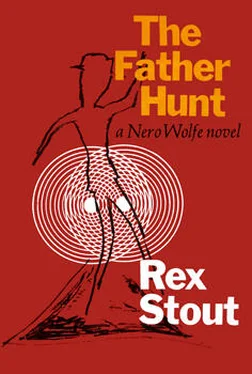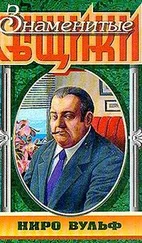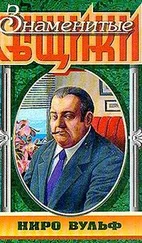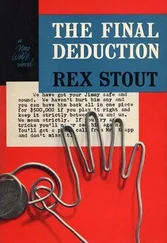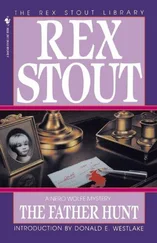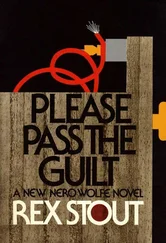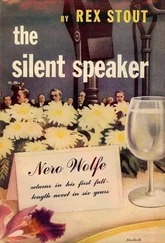They would probably be expecting us to come down together in the elevator, so when Wolfe left the stool and unbuttoned the smock I said I would take the stairs and went. Since all three flights are carpeted, noise was no problem, and they didn’t even know I was there, in the office doorway, until I spoke. Stebbins was seated at my desk, with two drawers open, and Cramer was over by the cabinets but with none of them open because they had locks.
I said, “I hadn’t opened the safe yet. Sorry.”
Cramer about-faced and narrowed his eyes at me. Stebbins merely took more papers from a drawer and started leafing through them. A cop inside the house. The sound came of the elevator descending, and it stopped, and as Wolfe came I stepped into the office. He entered, halted, shot a glance at Cramer, glared at Stebbins, who went right on with papers, and said, “Get Mr. Parker. I’ll take it in the kitchen.”
“What did you expect?” Cramer demanded. “Knock it off, Purley. Goodwin wants his chair. Come on, move!”
Stebbins tossed papers on my desk, a mess, got to his feet in no hurry, and went to get one of the yellow chairs. He likes to be with his back to a wall. By the time he had the chair where he wanted it. Cramer was in the red leather chair and Wolfe, at his desk, had a drawer open to see if it was in order. He made a face and turned to Cramer. “The briefer we make this the better. You want to know who made those fingerprints.”
“You’re damned right I do. And I want—”
“I know what you want, but something I want comes first. I will not have that man” — he aimed a straight finger at Stebbins — “in my house. Ransacking my office? Pfui. I would like to exclude you too, but someone even less tolerable would probably replace you. Archie. On a letterhead, Mr. Vance’s name and both addresses and telephone numbers. One carbon.”
It took longer than usual to get paper and carbon in the typewriter on account of the mess Stebbins had made. As I typed Cramer said something, saw that Wolfe wasn’t listening and didn’t intend to, and shut his trap. As I rolled the paper out Wolfe said, “One to each,” and I went and handed Cramer the original and Stebbins the carbon, and Wolfe told Cramer, “Get him out of here.”
You have to admit that he knows when he can get away with what. In any ordinary circumstances he wouldn’t have tried telling Cramer to get Stebbins out of there, but I had just given him the name and address of a man who had left his cigar case in a hit-and-run car.
Cramer said to Wolfe, “Floyd Vance. Was it his prints on that stuff you sent me?”
Wolfe said, “Yes. He made most of them last evening, in my presence, and Mr. Goodwin’s, sitting in that chair.”
Cramer turned to Stebbins and said, “Get him and take him in.”
Stebbins got up and went.
So that man was out of there. As he turned into the hall Wolfe said, “You have been scampering around on a hot day and would presumably like something to drink, but you have forfeited your right to civilities. We’ve given you the name of a man you’ve been seeking for more than three months. What else do you want?”
The air conditioning had dried the sweat on Cramer’s forehead and taken some of the red from his face. “I want plenty,” he said. “I want one good reason why you and Goodwin shouldn’t be charged with withholding information of a crime and obstructing justice. I want to know how long you have known that this Floyd Vance was the driver of that hit-and-run car, and how you spotted him. I want to know if he’s the father you said you were looking for, and if so, and Elinor Denovo was the mother, I want to know why he killed her.”
“That will take a lot of talking, Mr. Cramer.”
“It sure will. Even for you. Go right ahead.”
Wolfe adjusted his bulk in the chair. “First, withholding information. Last Thursday Mr. Goodwin gave you our word that if we got anything you might be able to use we would pass it on to you before we made any use of it ourselves. We got those fingerprints late last evening and delivered them to you early this morning, and we have made no use of them and don’t intend to. I have no other information that you might be able to use, in my judgment.”
“To hell with your judgment. If you think you can decide—”
“If you please. You told me to talk. As I told you, my client was, and is, a young woman who hired me to find her father. We found one likely prospect but investigation conclusively eliminated him. We found another, but he too was eliminated. I was inclined to return the retainer and withdraw, and persisted only because I am what I call tenacious and Mr. Goodwin calls pigheaded. Do you recognize the name Raymond Thorne?”
“Raymond Thorne? No.”
“Doubtless some of your staff would. Elinor Denovo spent most of her adult life working for him. Raymond Thorne Productions. Television. He came at my request last Thursday evening and answered questions for more than four hours, and one of the many things I learned was that a man named Floyd Vance had tried many times last May to see Elinor Denovo, and she had refused to see him. His last attempt to see her was on the twenty-second of May, only four days before she died. If you had questioned the receptionist at Raymond Thorne Productions with sufficient perseverance you might have solved that case long ago. We made long and laborious inquiries about Floyd Vance and discovered that he had known Elinor Denovo in nineteen forty-four, when she was Carlotta Vaughn, and had seen her frequently for several months. It was possible that he was the father I was trying to find, and we tackled him. He is a self-styled public-relations counselor — one of the various modern activities that are an insult to the dignity of man. Mr. Goodwin got him here last evening. Preparations had been made. His attempts to see Elinor Denovo shortly before her death prompted the surmise that he had killed her, and, knowing that you had fingerprints, Mr. Goodwin and Mr. Panzer made proper arrangements. That was fortunate, but not for me, for you. Without that you would probably never had found him. And here you come—”
“I’m supposed to pin a medal on you?”
“I don’t like medals. The fingerprints didn’t help me any. He denied that he had fathered a child by Carlotta Vaughn. He could have been lying, certainly, but I was helpless. And am. Even if he is the man I’m looking for there is no conceivable way to establish it. Can you suggest one?”
“I handle homicides, not paternity suits.”
“So you do. Now, with those fingerprints, you can handle this one. You said you want to know why he killed her. So do I. I haven’t the slightest notion. I have told you everything I know about him. I have seen him only once, here last evening, and I asked him no questions pertaining to Elinor Denovo’s death. I asked him nothing about his attempts to see her in May. Now, of course, you will, because you have a motive, and it’s possible that you will uncover one that will have a bearing on my problem. If you do, and if you can share it with me without hazard to your case, I’ll try to erase from memory this morning’s outrageous performance. It won’t be easy — especially the sight of that creature at Mr. Goodwin’s desk, deranging his and my belongings, while you stood and applauded.”
“I did not applaud. Your usual exaggeration.”
“You permitted.”
“Oh, skip it. A cop gets habits like everybody else. He was looking for information, not evidence. Even if he had found Goodwin’s signed confession that he had killed Elinor Denovo it wouldn’t have been admissible evidence; ask the Supreme Court.” Cramer looked at his watch and then at me. “How long has he been gone?”
Читать дальше
